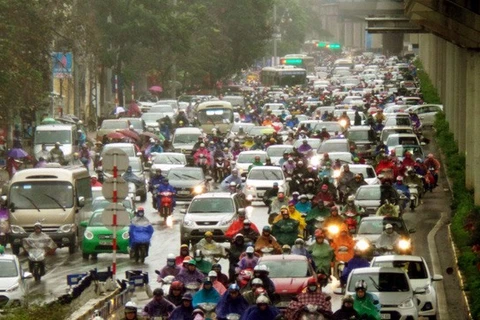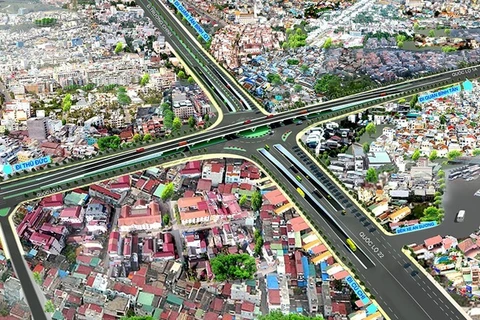Hanoi (VNA) - Police in the capital city have said they are considering electronic (and automatic) charging of traffic fines to offenders’ bank accounts. Police officers are mostly supportive of the idea, while others, including car drivers and authority figures, are not so impressed, urging careful study.
The novel idea was recently put forward by Brigadier Dao Thanh Hai, Deputy Director of the Hanoi municipal Department of Public Security, in a conference held last weekend announcing the transport sector’s activity plan for 2017.
Hai requested the Ministry of Public Security (MoPS) to work on the proposal to submit to the Government for consideration.
According to this proposal, car owners would be required to open a bank account and a certain amount of money is to be deposited in that account. Should violations occur, by identifying car owners via images captured by traffic cameras, fines will be automatically debited from the offenders’ accounts.
Part of the reason for this proposal is, as Hai said, the police still face a number of difficulties in handling traffic violations, especially in cases of offenders whose car ownership certificates were not registered under their names.
Those who do not have proper ownership certificates for their vehicles will be forced to do so. Thus, law-enforcement and authorities will have an easier time managing cars.
More importantly, Hai is convinced that when an amount of money is reserved in bank accounts specifically for paying fines and the fines are automatically deducted; car owners will have no choice but to pay more attention and obey traffic laws, be it parking in designated zones or wearing seatbelts, or speeding. Two birds with one stone, Hai added.
Fully backing the measure, Colonel Nguyen Van Quy, former handler of traffic violations at the Traffic Police Unit No 1, said this will enhance drivers’ awareness to better follow the rules.
Better yet, Quy added that if the offenders happen to be working in State agencies, the automatic fine collection will prevent the higher-ups from being able to pull strings or exert their influence on police officers to get out of trouble.
This is something the public might appreciate, when all drivers are treated fairly, Major Nguyen Manh Hung, deputy head of the Road and Railway Traffic Police under the Hanoi Police, said in approval of the measure.
“Besides, the offender doesn’t have to waste time [going to the State Treasury] to pay their fines,” Hung stressed.
Currently, traffic offenders pay on-the-spot fines in cash to police officers, which is more convenient for people, but not for the police officers.
Dr. Luong Thanh Cuong, head of the Faculty of State and Law Studies, from the National Academy of Public Administration, said allowing offenders to pay fines via bank accounts would free up traffic police officers from redundant tasks in order to focus on their primary role – to direct traffic and ensure traffic safety.
“Traffic police officers have to carry with them all kinds of traffic ticket receipts. At the end of the working day or the day after, they have to bring the collected money to the State treasury. All the efforts devoted to calculating, counting, and keeping the fine money, are really unnecessary and distracting them from what they are supposed to do.”
A more subtle advantage, Cuong added, is that payment via banks would help to end the unbecoming sight of arguing, ‘dealing’ and exchanging money between traffic police officers and traffic offenders on the streets.
Drivers may appreciate the fairer treatment as a result of automatic fine collection.
However, car drivers still have many concerns regarding the proposal.
According to Nguyen Xuan Thong, 31, in Thanh Xuan District of Hanoi, this is a very novel idea, and he wanted to know if the two methods, fine payment via bank accounts and by cash can be accepted simultaneously, or the former will be preferred.
Thong is also concerned with exactly how the method will be implemented. Will those who commit traffic infringements suffer deductions immediately after being identified by traffic cameras, or will the agency handling traffic violations send offenders a notice, and only when the notice is accepted by the offender will their bank account be charged?
Bui Danh Lien, Chairman of the Hanoi Transport Association, said even though he was in favour of setting up a bank account for easier fine collection, valuing the fairness and transparency it helps to create, requiring car owners to set up a bank account just to pay fines is unreasonable.
According to Lien, the trouble is Vietnamese people still prefer dealing in cash rather than by debit or credit cards.
Another thing that might be problematic, he said, is that money deposited in the new bank account must be equal or higher than the highest penalty – which hovers somewhere around 20 million VND (890 USD) as per Decree No 46, effective from August last year. This amount might not be much of a problem for individual car owners, but for an enterprise with hundreds of cars, it would be a significant financial burden.
Major General Tran The Quan, Deputy Chief of the MoPS’s Legal and Judicial Administrative Reforms Department, while supporting the proposed measure, said many potential issues must be resolved prior to implementation. For example, will this measure be extended to motorbikes? Investment into modern traffic camera systems that will produce convincing evidence of violations will certainly be a considerable sum. The working partnership between police authorities and the banks also needs to be figured out.
Quan also said a detailed roadmap must be released for feedback if the authorities decide to proceed with the idea.
Back in November 2015, in a bid to ease traffic congestion in Hanoi and HCM City, the then Deputy Prime Minister Nguyen Xuan Phuc ordered the MoPS, Ministry of Finance and the State Bank of Vietnam to immediately work on a plan to implement collecting fines via bank accounts.
It is not the first time that this idea has been floated by the city’s police heads, but the plan remains in the proposal phase.-VNA
The novel idea was recently put forward by Brigadier Dao Thanh Hai, Deputy Director of the Hanoi municipal Department of Public Security, in a conference held last weekend announcing the transport sector’s activity plan for 2017.
Hai requested the Ministry of Public Security (MoPS) to work on the proposal to submit to the Government for consideration.
According to this proposal, car owners would be required to open a bank account and a certain amount of money is to be deposited in that account. Should violations occur, by identifying car owners via images captured by traffic cameras, fines will be automatically debited from the offenders’ accounts.
Part of the reason for this proposal is, as Hai said, the police still face a number of difficulties in handling traffic violations, especially in cases of offenders whose car ownership certificates were not registered under their names.
Those who do not have proper ownership certificates for their vehicles will be forced to do so. Thus, law-enforcement and authorities will have an easier time managing cars.
More importantly, Hai is convinced that when an amount of money is reserved in bank accounts specifically for paying fines and the fines are automatically deducted; car owners will have no choice but to pay more attention and obey traffic laws, be it parking in designated zones or wearing seatbelts, or speeding. Two birds with one stone, Hai added.
Fully backing the measure, Colonel Nguyen Van Quy, former handler of traffic violations at the Traffic Police Unit No 1, said this will enhance drivers’ awareness to better follow the rules.
Better yet, Quy added that if the offenders happen to be working in State agencies, the automatic fine collection will prevent the higher-ups from being able to pull strings or exert their influence on police officers to get out of trouble.
This is something the public might appreciate, when all drivers are treated fairly, Major Nguyen Manh Hung, deputy head of the Road and Railway Traffic Police under the Hanoi Police, said in approval of the measure.
“Besides, the offender doesn’t have to waste time [going to the State Treasury] to pay their fines,” Hung stressed.
Currently, traffic offenders pay on-the-spot fines in cash to police officers, which is more convenient for people, but not for the police officers.
Dr. Luong Thanh Cuong, head of the Faculty of State and Law Studies, from the National Academy of Public Administration, said allowing offenders to pay fines via bank accounts would free up traffic police officers from redundant tasks in order to focus on their primary role – to direct traffic and ensure traffic safety.
“Traffic police officers have to carry with them all kinds of traffic ticket receipts. At the end of the working day or the day after, they have to bring the collected money to the State treasury. All the efforts devoted to calculating, counting, and keeping the fine money, are really unnecessary and distracting them from what they are supposed to do.”
A more subtle advantage, Cuong added, is that payment via banks would help to end the unbecoming sight of arguing, ‘dealing’ and exchanging money between traffic police officers and traffic offenders on the streets.
Drivers may appreciate the fairer treatment as a result of automatic fine collection.
However, car drivers still have many concerns regarding the proposal.
According to Nguyen Xuan Thong, 31, in Thanh Xuan District of Hanoi, this is a very novel idea, and he wanted to know if the two methods, fine payment via bank accounts and by cash can be accepted simultaneously, or the former will be preferred.
Thong is also concerned with exactly how the method will be implemented. Will those who commit traffic infringements suffer deductions immediately after being identified by traffic cameras, or will the agency handling traffic violations send offenders a notice, and only when the notice is accepted by the offender will their bank account be charged?
Bui Danh Lien, Chairman of the Hanoi Transport Association, said even though he was in favour of setting up a bank account for easier fine collection, valuing the fairness and transparency it helps to create, requiring car owners to set up a bank account just to pay fines is unreasonable.
According to Lien, the trouble is Vietnamese people still prefer dealing in cash rather than by debit or credit cards.
Another thing that might be problematic, he said, is that money deposited in the new bank account must be equal or higher than the highest penalty – which hovers somewhere around 20 million VND (890 USD) as per Decree No 46, effective from August last year. This amount might not be much of a problem for individual car owners, but for an enterprise with hundreds of cars, it would be a significant financial burden.
Major General Tran The Quan, Deputy Chief of the MoPS’s Legal and Judicial Administrative Reforms Department, while supporting the proposed measure, said many potential issues must be resolved prior to implementation. For example, will this measure be extended to motorbikes? Investment into modern traffic camera systems that will produce convincing evidence of violations will certainly be a considerable sum. The working partnership between police authorities and the banks also needs to be figured out.
Quan also said a detailed roadmap must be released for feedback if the authorities decide to proceed with the idea.
Back in November 2015, in a bid to ease traffic congestion in Hanoi and HCM City, the then Deputy Prime Minister Nguyen Xuan Phuc ordered the MoPS, Ministry of Finance and the State Bank of Vietnam to immediately work on a plan to implement collecting fines via bank accounts.
It is not the first time that this idea has been floated by the city’s police heads, but the plan remains in the proposal phase.-VNA
VNA
























